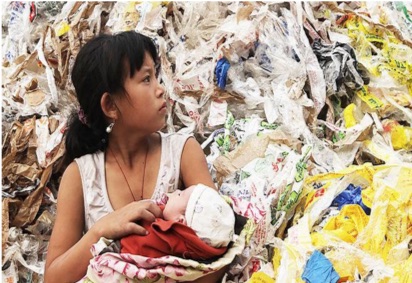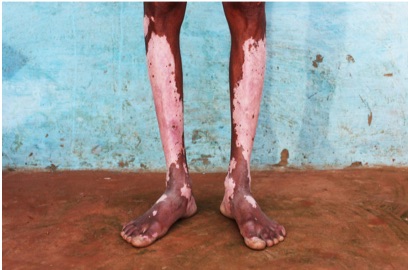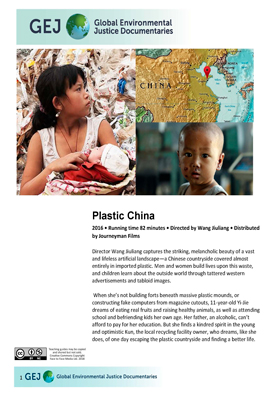Curator
 — Ken Berthel, Assistant Professor of Chinese, Whittier College
— Ken Berthel, Assistant Professor of Chinese, Whittier College
Plastic China
Reveals the unsafe conditions in which adults and children alike toil, as they seek to eke out a basic living by processing toxic plastic waste products.

Curator
This film was selected by Ken Berthel, Assistant Professor of Chinese, Whittier College
Why I chose this film
This polished and engaging documentary is of value to educators in numerous fields who wish to expose students to the impacts of consumption and globalization in China.
Plastic China is a film that inspires discussion about a number of salient topics, including globalization, modernity, rural-urban divide, and the human and environmental impacts of consumerist culture. As all of these issues are also raised in fictional works from the Chinese film canon —including Wang Xiaoshuai’s Beijing Bicycle, Jia Zhangke’s The World, and even Zhang Yang’s Shower— presenting Plastic China as a testament to the real-life issues to which fictional counterparts refer can enhance the impact of fictional and documentary narrative alike.
Teacher's guide
Please see the teacher's guide for maps, background information, suggested subjects, questions and activities.
Synopsis
Plastic China’s main character, Yi-Jie, is an unschooled 11-year-old girl whose family works and lives in a typical plastic waste household-recycling workshop. She learns about the outside world sorting through the plastic refuse imported from the USA, Europe, and Japan that surrounds her. Small packs of discarded instant black powder tells her the bitter taste of “coffee,” the English children’s learning cards teach her words like “summer” and “father’s day,” and discarded plastic dolls are her toys. This is her world.
Her father, Peng, had promised to send her to school five years earlier but not yet delivered. Instead, he spends much of his hard-earned money from the plastic workshop on alcohol. However, Yi-Jie keeps her wish alive of going to school one day, and we see her holding her playful campaign towards learning and schooling. Will she succeed to sit in a classroom and learn? Or will she succeed her parents as an illiterate laborer in the recycling workshop?
The environmental justice focus of the film
Plastic China reveals the unsafe conditions in which adults and children alike toil, as they seek to eke out a basic living by processing toxic plastic waste products that they know are polluting their rivers and lakes, contaminating the air that they breathe, and compromising their health in noticeably painful ways. The film exposes not only a disparity between Western lifestyles of consumption and those who deal with the concomitant waste, but also in the hierarchical structure of facility owners and the workers they employ for low compensation in unhealthy and sometimes abusive environments.
If time is short, a selection of four excerpts with a running time of 35 minutes can be viewed at Plastic China (Selected Excerpts)
Download the teacher's guide for Plastic China (PDF)
—
REVIEWS
Director Jiu-liang Wang’s follow-up to debut documentary Beijing Beseiged By Waste (2011), Plastic China captures a plaintive sense of the human casualties from unfettered global consumerism. His gently observed portrait of the families toiling at a plastic recycling factory in Shandong builds into a damning commentary on a modern China marked by extreme divides in wealth and opportunity. Wide festival exposure seems assured, particularly at events with a focus on environmental issues, and specialist distribution is a strong possibility. – Allan Hunter, Screen Daily Wang delicately balances the perspectives of Yi-Jie, her father, and Kun, alternating the child’s wonderment in and adaptability to her surroundings with the adults’ more grounded, and sad, apprehension of their present circumstances, revealing at the same time a sense of modern-day China coping with inequality in its rapidly developing economy. The film’s inclusion in this year’s environmentally-themed The New Climate underscores the global dimensions – and impact – of our disposable culture. – Basil Tsiokos, All Things Documentary
To say that Plastic China is an eye opener is an understatement. An look at a onetime farmer who now runs a plastic recycling plant and is just getting by the film is a glaring example of the gulf between the haves and have nots in modern day China. Plastic waste from all over the world is shipped to China where it is shred and then recycled. The tedious work of sorting all the refuse is done by poorly paid workers. Kun and his family does most of the work with the help of Peng who get paid a couple of dollars a day - which he promptly drinks leaving nothing for his own family to live on. – Steve Kopian, Unseen Films
“It is very important work, a milestone,” Ma Jun, the director of the Institute of Public and Environmental Affairs
“The incredible influx of waste into China also spawned entire towns devoted to recycling, where adults and children alike were often subjected to dangerous working conditions and exposed to toxic chemicals. One such community was spotlighted in Wang Jiuliang’s acclaimed documentary “Plastic China,” which screened at the Sundance Film Festival last year. The film triggered a surge of public anger in China — and observers say the film, though scrubbed from the Chinese internet soon after its original release in 2014, may have played a part in forcing Beijing to rethink its role in the global waste industry.” -- Dominique Mosbergen, The Huffington Post 24 Jan 2018
Review for Video LIbrarian by Ally Ham
12 April 2023 Four stars **** Highly Recommended
Plastic China
This observational documentary and its teacher’s guide would be valuable teaching tools for academic subjects such as environmental studies, ethics and human rights, consumerism and sustainability, and Asian studies.
Director Jiu-Liang Wang’s Plastic China is an observational documentary about a recycling workshop in China that processes plastic waste, although the 80-minute-long feature could nearly pass for a narrative film. Amongst mounds upon mounds of plastic from other countries, two families scrape together a living by recycling the waste. An engrossing narrative arc about their lives centers on Yi-Jie, an 11-year-old girl who must put aside her own dreams of schooling in favor of working in the factory and caring for her younger siblings. Along with its accompanying teacher’s guide, Plastic China uses Yi-Jie’s story to encourage deeper thinking about the negative impacts of global consumerism on the recycling industry.
Plastic China begins with a title card informing us that “China is the leading importer of plastic wastes.” It’s the only piece of information that’s directly given to us, and perhaps even that’s unnecessary. For as soon as the focal recycling facility comes into view, we can see a rampant display of global consumerism’s consequences–no commentary required. Wang quietly captures the low quality of living experienced by facility owner Kun’s family, and even more so by the family of his employee Peng.
Only occasionally acknowledging Wang’s presence, the families go about their day-to-day lives throughout the observational documentary. While not helping the adults with sorting and recycling, Peng’s and Kun’s children are jumping into piles of plastic waste or picking through them to find their newest toys. Parents to Yi-Jie, Peng and his pregnant wife work for measly salaries that can’t support their kids’ schooling (at least as long as Peng clings to his drinking habit). And while Peng promises Yi-Jie they’ll soon go home to Sichuan, Wang’s direction allows us to see the situation through Yi-Jie’s eyes–and it feels increasingly hopeless.
Kun regards Peng’s choices with disdain. He is able to send his only son to school, although he too struggles to provide for his family because of the rising costs of maintaining the recycling facility. Kun is a dreamer, gazing longingly at the Western world and refusing practical expenditures like doctor’s appointments in favor of buying a new car. Wang’s camera follows Kun, Peng, and Yi-Jie not with a judgmental gaze, but an objective display of their difficult circumstances. They come from such a disadvantaged place they can’t help but be enamored with Western commercialism, even as they are weighed down by it. The judgment falls on viewers, then, as unrestricted consumers.
The ending to the observational documentary shrouds Yi-Jie and her family’s future in uncertainty. Will they ever get home? Will Yi-Jie ever receive schooling as she wishes, or will she be resigned to work a life of dangerous, unskilled labor? We receive no solid conclusion, but the end of the narrative arc holds poignancy and conviction–evoking the uncertainty of low-wage workers’ day-to-day lives. We may see our plastic waste as disposable, even recyclable, but Plastic China reminds us: The futures of recycling workers and their children are not.
Plastic China’s scope may be limited without the addition of guiding commentary, but the documentary offers a compelling jumping-off point for further discussion regarding plastic waste and the recycling industry. Discussion questions, activities, and other supplemental materials may be found in the film’s downloadable teacher's guide. Highly Recommended.
What academic subjects would this film be suitable for?
This observational documentary and its teacher’s guide would be valuable teaching tools for academic subjects such as environmental studies, ethics and human rights, consumerism and sustainability, and Asian studies.
How does this film contribute to a discussion of environmental or climate justice?
Plastic China reveals that environmental justice solutions are not as simple as recycling waste, and encourages viewers to evaluate consumer practices as well. Additionally, the documentary now serves as a piece of China’s history. The teacher’s guide states that “in 2018 … the Chinese government declared a ban on mass imports of plastic waste,” so the observational documentary can contribute to a discussion of the country’s environmental future and changes that are still to come.
What type of library programming could use this title?
Library environmental programs can utilize Plastic China for educational screenings about plastic waste, global consumerism, and recycling.
Citation
Main credits
Wang, Jiuliang (film director)
Wang, Jiuliang (director of photography)
Chen, Ruby (film producer)
Other credits
Supervising editor, Jean Tsien; editor, Bob Lee; music, Tyler Strickland.
Distributor credits
Julie Chen
Wang Jiuliang
Director- Wang Jiuliang
Producer-Ruby Chen
Composer-Tyler Strickland
Docuseek subjects
Asian Studies
Anthropology and Archaeology
Recycling and Waste
Toxic Chemicals
Environmental Health
Sustainability
Toxic Waste
Trade
Communication and Media Studies
Working Conditions
Occupational Health and Safety
Manufacturing
History
Environmental Science
Human Rights
Global / International Studies
Globalization
Film and Video Studies
Pollution
Ethics
Family Issues
East Asia
Women's Studies
Distributor subjects
China
Consumerism
Environmental Justice
Gender Studies
Global Issues
Globalization
Health and Health Care
Manufacturing
Occupational Health and Safety
Pollution
Sustainability
Toxic Chemicals
Toxic Waste
United States
Youth and Family
Keywords
Welcome to Docuseek2!
Docuseek2 is a streaming platform of the best documentary and social issue films available for the higher education community.
Anyone may search for titles and find detailed information about the titles. To preview films or license them for streaming, you must register and login.
Currently, we support online registration for anyone affiliated with a higher education institution. Please inquire if you are with a K-12 district or school or with a public library.
Click the Close button to get started!


